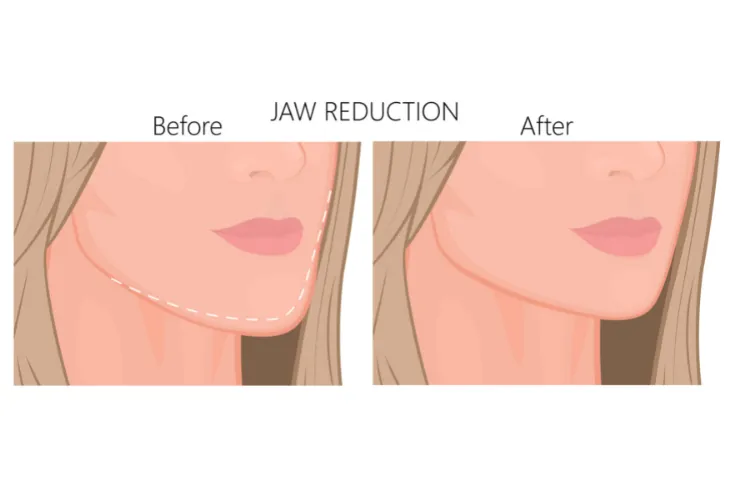Contouring has become a go-to makeup technique for people wanting to achieve a sharp and defined jawline. Those who want to consider an option that’s much more permanent can look into jawline reduction surgery. This procedure completely reshapes the jaw, resulting in a more chiseled appearance.
Jawline reduction surgery isn’t something you should decide to do on a whim. This is an invasive surgery with necessary costs, possible complications, and recovery time. Here’s a rundown of what you should know about this cosmetic procedure.
What Is Jawline Reduction Surgery?
A jawline reduction surgery aims to narrow the appearance of your lower face. It can reshape the upper or lower jaw and chin by reducing the bone to give it a slimmer look. Surgeons can help you achieve a certain result by choosing from a variety of different surgical techniques.
Ultimately, jawline reduction surgery can help you achieve the following:
- A slimmer jawline
- More defined lower half of your face
- Permanent results
- Individual care based on your desired results and bone structure
How Jawline Reduction Surgery Works
It’s recommended that a person doesn’t get this surgery until they are fully grown. Patients will have to undergo general anesthesia for this procedure. Healthline says the procedure focuses on the back of the jaw, by the ears. It involves shaving the bone to reduce the size of the jaw.
Surgeons cut from the inside of the mouth to prevent scarring. They may use things like tiny bone plates, screws, wires, or rubber bands to secure the jaw in place. Over time, these permanent screws will integrate into the jaw. Finally, surgeons might even cut and reposition any teeth that are misaligned.
The Cost of Jawline Reduction Surgery
Undergoing jawline reduction surgery is an investment. According to RealSelf, the average cost for this procedure is $7,100 (USD). The price can even be as high as $18,700. The cost of surgery will depend on several factors including your surgeon’s level of experience, where you’re located, and who administers your anesthesia.
Keep in mind that cosmetic procedures are not typically covered by insurance companies, so you will have to pay for the surgery out of pocket. Additional costs to consider are prescription medications, taking time off work for recovery, and potential medical treatment if you experience complications.
Recovering From Jawline Reduction Surgery
It’s important to take care of yourself after any surgery, including jawline reduction surgery. It’s normal to feel some discomfort and swelling. Most people can return to work 2-weeks after surgery, though it can take up to 12-months for a full recovery.
You have to take it easy and listen to your surgeon after surgery. They will advise you about what’s safe to eat, drink, and even how to sleep. Patients should also avoid strenuous activity until they are cleared by the doctor. These kinds of precautions prevent you from damaging the jaw and increasing the recovery time.
Possible Complications
Jawline surgery is a serious procedure that comes with its own set of complications. While it might be for cosmetic purposes, that doesn’t change the fact that it’s a surgery that can take a toll on your body.
Healthline says, some potential complications that can occur from jawline reduction surgery are:
- Swelling
- Blood loss
- Infection
- Scarring
- Nerve damage
- Pain
Non-Surgical Jawline Contouring
If you want a slimmer jaw but don’t want to commit to surgery, there is a less invasive option to consider. Some medical practices can contour the jaw without surgery. This option works by injecting a muscle relaxant into the jaw muscle to release tightness.
The procedure can reduce the squareness of the jaw without cutting, shaving, or stitching the face. Toronto Cosmetic Clinic says the number of injections you’re given will depend on the size of your jaw and your desired results.
Learn More About It From a Surgeon
For anyone insecure about their jawline, it might be worth looking into jawline reduction surgery. The procedure can either make the jaw appear slimmer or enhance the jaw for more definition. Whatever the reason, make sure to consult with a trained surgeon with experience.
Alternatively, see if there is a way to contour your jaw with the use of injections instead of surgery. You can also check out before and after results from past patients to see what your potential results could look like.










